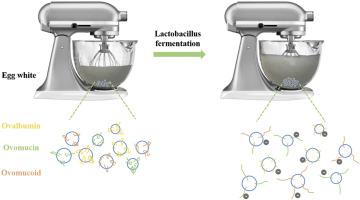当前位置:
X-MOL 学术
›
Food Hydrocoll.
›
论文详情
Our official English website, www.x-mol.net, welcomes your
feedback! (Note: you will need to create a separate account there.)
Mechanism study on enhanced foaming properties of individual albumen proteins by Lactobacillus fermentation
Food Hydrocolloids ( IF 11.0 ) Pub Date : 2021-02-01 , DOI: 10.1016/j.foodhyd.2020.106218 Jie Jia , Bing Ji , Liangjie Tian , Mei Li , Mei Lu , Long Ding , Xuebo Liu , Xiang Duan
Food Hydrocolloids ( IF 11.0 ) Pub Date : 2021-02-01 , DOI: 10.1016/j.foodhyd.2020.106218 Jie Jia , Bing Ji , Liangjie Tian , Mei Li , Mei Lu , Long Ding , Xuebo Liu , Xiang Duan

|
Abstract Our recent research showed that moderate Lactobacillus fermentation endowed egg white with stronger foaming properties. But the individual contribution of albumen proteins and the relative mechanisms during the process were still not clear. In this study, three major egg white proteins (ovalbumin, ovomucin and ovomucoid) were singly fermented by multiple Lactobacillus (Lactobacillus delbruekii ssp. bulgaricus, Lactobacillus acidophilus, Streptococcus thermophilus and Bifidobacterium animalis) for 0, 3, 6 and 9 h, and the surface activity, degradation, apparent viscosity and foaming properties were investigated. For ovalbumin, the surface hydrophobicity largely increased at 3 h and then began to decrease; combined with the gradual degradation by protease, the foaming ability of ovalbumin significantly increased at 3 h and then decreased at 6 and 9 h of fermentation. The fermented ovomucin and ovomucoid possessed an improved surface characteristics and appropriate apparent viscosity; correspondingly, the both proteins exhibited the enhanced foaming ability and stability after fermentation. This work revealed the molecular mechanism behind Lactobacillus fermentation treatment increased foaming properties of egg white, and provided basic information on the application of fermentation approach in improving functionalities of egg white in industry.
中文翻译:

乳酸菌发酵增强单个蛋白起泡特性的机理研究
摘要 我们最近的研究表明,适度的乳酸菌发酵赋予蛋清更强的起泡特性。但蛋白蛋白的个体贡献及其在此过程中的相关机制尚不清楚。在这项研究中,三种主要的蛋清蛋白(卵清蛋白、卵粘蛋白和卵类粘蛋白)分别由多种乳杆菌(德氏乳杆菌保加利亚亚种、嗜酸乳杆菌、嗜热链球菌和动物双歧杆菌)单独发酵,分别为 0、3、6 和 9研究了表面活性、降解、表观粘度和发泡性能。对于卵清蛋白,其表面疏水性在 3 h 时大幅增加,然后开始下降;结合蛋白酶的逐渐降解,卵清蛋白的起泡能力在发酵3h时显着增加,然后在发酵6h和9h时降低。发酵后的卵粘蛋白和卵类粘蛋白具有改善的表面特性和适当的表观粘度;相应地,这两种蛋白质在发酵后都表现出增强的发泡能力和稳定性。这项工作揭示了乳酸菌发酵处理增加蛋清发泡特性的分子机制,并为发酵方法在工业上改善蛋清功能的应用提供了基础信息。
更新日期:2021-02-01
中文翻译:

乳酸菌发酵增强单个蛋白起泡特性的机理研究
摘要 我们最近的研究表明,适度的乳酸菌发酵赋予蛋清更强的起泡特性。但蛋白蛋白的个体贡献及其在此过程中的相关机制尚不清楚。在这项研究中,三种主要的蛋清蛋白(卵清蛋白、卵粘蛋白和卵类粘蛋白)分别由多种乳杆菌(德氏乳杆菌保加利亚亚种、嗜酸乳杆菌、嗜热链球菌和动物双歧杆菌)单独发酵,分别为 0、3、6 和 9研究了表面活性、降解、表观粘度和发泡性能。对于卵清蛋白,其表面疏水性在 3 h 时大幅增加,然后开始下降;结合蛋白酶的逐渐降解,卵清蛋白的起泡能力在发酵3h时显着增加,然后在发酵6h和9h时降低。发酵后的卵粘蛋白和卵类粘蛋白具有改善的表面特性和适当的表观粘度;相应地,这两种蛋白质在发酵后都表现出增强的发泡能力和稳定性。这项工作揭示了乳酸菌发酵处理增加蛋清发泡特性的分子机制,并为发酵方法在工业上改善蛋清功能的应用提供了基础信息。











































 京公网安备 11010802027423号
京公网安备 11010802027423号